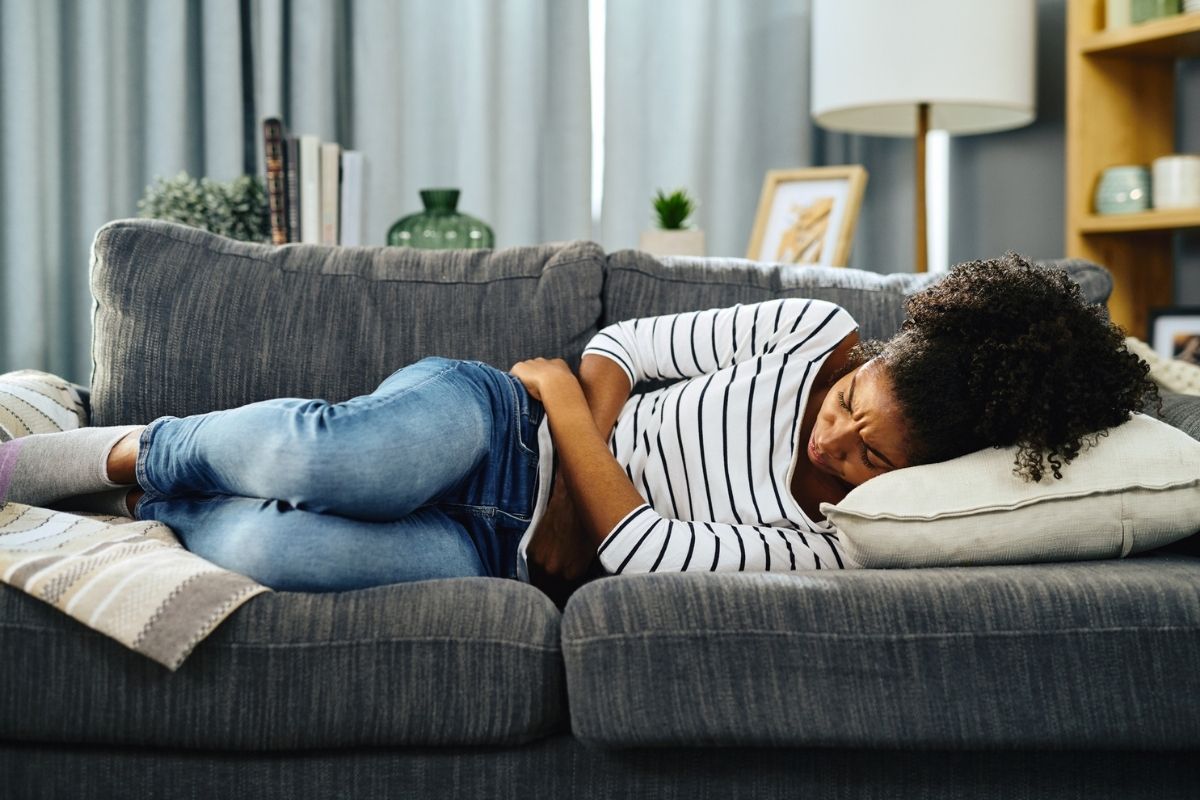
Is it ‘just period pain’ or something more? We take a look at some of the causes of menstrual pain, and how you can get help.
In this article:
It’s a feeling you might know well – curled up on the couch with cramping abdominal pain, wishing it would stop.
Period pain (known medically as dysmenorrhoea) is often considered just part of life. But for some people, the pain can be intense, and even debilitating at times.4
So what causes it? And how do you know when it might be a sign of something more serious?
We take a look at what health experts say about the different types of period pain, other conditions that might cause severe period pain, and where to get help.
What is period pain?
When you menstruate, your uterus sheds its lining, which builds up over the month. Period pain happens when the muscles of the uterus contract during this process.1
Many people who menstruate experience at least some discomfort or mild pain leading up to and during their period.1
However, for some people the pain is more severe, and it can stop them from doing their normal day-to-day activities.1
There are two types of period pain:
- Primary dysmenorrhoea. This is the most common type of period pain, as described above. This is considered ‘normal’ (i.e. it’s not caused by an underlying condition).
- Secondary dysmenorrhoea. This is often more severe pain, caused by an underlying condition affecting the female reproductive system. 1
Along with abdominal pain, you may also experience pain in your lower back or legs – plus other symptoms like nausea, vomiting, headaches and digestive problems.2
What can help with period pain?
According to health experts, normal period pain will typically only last the first couple of days of your period, and simple home treatments can usually bring some relief.3
A few things that many people find helpful include:
- Over-the-counter pain-relieving medications (such as paracetamol or ibuprofen)
- Exercise and stretching
- Relaxation techniques (like yoga, meditation, breathing exercises, or just resting)
- Applying heat to the painful area (like a heat pad or hot water bottle, or having a warm bath)
- Going on the oral contraceptive pill (talk to your doctor about if this could be a good option for you).3
How can HBF help?
- Physiotherapy. HBF extras cover can give you benefits towards visits with a physiotherapist, which may help manage period pain.4
- Natural therapies. Some people find acupuncture helpful for managing period pain.3 5 This is also available on some levels of HBF extras cover.
What if my pain is worse than that?
If the above techniques don’t help soothe the pain, it could be a sign of secondary dysmenorrhoea – period pain caused by an underlying condition.3
A few signs of secondary dysmenorrhoea include:
- Pain that isn’t helped by over-the-counter pain relievers
- Pain that stops you from going to work or school or generally going about your day
- Pain during times other than your menstrual period
- Pain during sex.1
It’s a good idea to talk to your GP if you’re experiencing these signs, or if you have any concerns about your periods.
What conditions can cause severe period pain?
There are several conditions that can cause secondary dysmenorrhoea.1 Some of the more common ones are:
- Endometriosis – a condition where cells similar to those normally found lining the uterus (the endometrium) grow outside the uterus. It’s estimated that one in nine women in Australia develops endometriosis by their 40s.6
- Adenomyosis – similarly, a condition where these uterus-lining cells grow in the muscle wall of the uterus. Symptoms often start late in women’s reproductive years, after having children.7
- Fibroids – non-cancerous growths of muscle tissue that can grow in and around the uterus. It’s not known what causes fibroids, but their growth has been linked to the hormone oestrogen.8
- Pelvic inflammatory disease – when an infection (usually sexually transmitted, such as chlamydia or gonorrhoea) spreads from the vagina to the upper reproductive organs.1
Where to seek help
If you’re experiencing severe period pain, a good first step is to talk to your GP.1
They can assess your symptoms and may decide to refer you to a gynaecologist – a doctor who specialises in the female reproductive system.
How can HBF help?
- Gynaecology (hospital services only). All levels of HBF hospital cover available for sale include gynaecology. This covers hospital treatment for conditions affecting the female reproductive system.
Period pain may be a common experience, but that doesn’t mean you have to suffer in silence. Whether it’s ‘normal’ pain or a sign of an underlying condition, there is support available to help.
Health cover to suit your needs
Tell us a bit about yourself, and in minutes we’ll help you find the best HBF cover options to suit you.
Find out more
Disclaimer:
This article contains general information only and does not take into account the health, personal situation or needs of any person. In conjunction with your GP or treating health care professional, please consider whether the information is suitable for you and your personal circumstances.